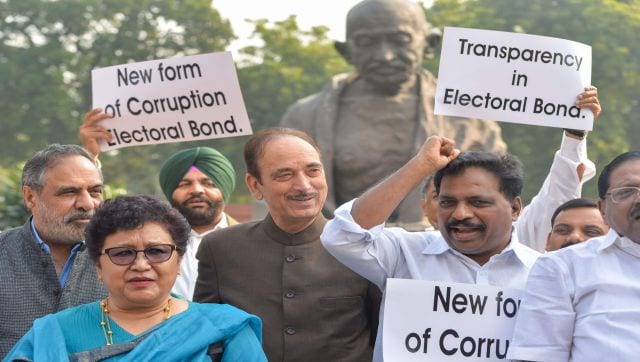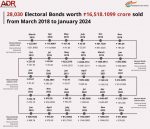The five-judge bench headed by Chief Justice of India Dr DY Chandrachud and comprising Justices Sanjiv Khanna, BR Gavai, JB Pardiwala and Manoj Mishra during pronouncement of verdict on electoral bond scheme. The Supreme Court Thursday struck down the electoral bonds scheme, calling it “unconstitutional”. PTI
In what is being termed as perhaps the most significant verdict of the year, the Supreme Court today (15 February) struck down the electoral bond scheme, terming it to be violative and unconstitutional.A five-judge Constitution bench headed by Chief Justice DY Chandrachud and comprising Justices Sanjiv Khanna, BR Gavai, JB Pardiwala and Manoj Misra delivered a unanimous verdict. However, Justice Khanna has penned a concurring opinion with a slightly different reasoning.According to experts, the judgment will have wider ramifications for political parties ahead of the crucial 2024 Lok Sabha elections.Related Articles The ‘secret’ about electoral bonds that you will know by March 13SC strikes down electoral bonds scheme, calls it unconstitutional, violative of RTI, free speechWe take a closer look at the apex court’s judgment and break it down for you.‘Electoral bonds violate right to information and freedom of speech’In pronouncing the verdict, CJI DY Chandrachud said that the electoral bond scheme is violative of freedom of speech and expression under Article 19(1)(a) of Constitution.The verdict stated that political parties are relevant political unit in the political process.The apex court stated that information about political funding is essential to exercise correct choice of voting. “Economic inequality leads to differing level of political engagements. Access to information leads to influencing the policy making and also leading to quid pro quo arrangements may also help a party by the party in power. Electoral Bonds scheme is violative of Right to Information under Article 19 (a)(a).”‘Electoral bonds scheme not only means of curbing black money’Electoral bonds had been introduced by the Centre with the objective of curbing the inflow of black money into the electoral system. However, in today’s verdict, the apex court held that it didn’t see the scheme as the only means to curb black money in the political ecosystem and that it was not proportionally justified.The verdict as per a report in Live Law read: “We are of the opinion that the restrictive means test of the doctrine of proportionality is not satisfied and there are other means other than electoral bonds to achieve the purpose of curbing black money, even assuming it to be a legitimate objective.“Contribution by other means of electronic transfer and electoral trusts is other restrictive means. Thus curbing black money is not a ground for electoral bonds,” read the verdict.MPs stage a protest over alleged electoral bond scam in front of the statue of Mahatma Gandhi, during the Winter Session of Parliament, in New Delhi. File image/PTI‘Unlimited contribution by companies is unconstitutional’The SC bench also stated that through electoral bonds companies could exert undue influence on political parties.The court said, “A company has more graver influence on the political process than contributions by individuals. Contributions by companies are purely business transactions. Amendment to Section 182 Companies Act is manifestly arbitrary for treating companies and individuals alike.”It added, “Amendment to the Companies Act (allowing blanket corporate political funding) is unconstitutional.”‘Bank shall forthwith stop the issue of electoral bonds’The apex court in its verdict has held that the issuing bank — State Bank of India (SBI) — shall immediately stop issuing electoral bonds.It has also mandated that the bank disclose details of political parties that received electoral bonds since the inception of the scheme in 2018. These particulars, including the date of purchase, name of the purchaser, denomination, and details of parties receiving contributions through electoral bonds, are to be submitted to the Election Commission of India (ECI) by 6 March.Additionally, the Election Commission shall publish this information on their official website by 13 March.Electoral bonds that haven’t been encashed shall be returnedThe five-judge bench has also ruled that electoral bonds which are within the validity period of 15 days but which have not been encashed by the political parties yet shall be returned by the political party to the purchaser. The issuing bank shall then refund the amount to the purchaser’s account.Reactions to the verdictShortly after the Supreme Court verdict was read out, the Congress welcomed the decision with general secretary Jairam Ramesh said, “The Supreme Court has held the much-touted Electoral Bonds scheme of the Modi Sarkar as violative of both laws passed by Parliament as well as the Constitution of India.”The long-awaited verdict is hugely welcome and will reinforce the power of votes over notes, he said.The Modi Sarkar has been inflicting ANYAY upon ANYAY on the Annadatas while privileging the Chandadatas, Ramesh said.Rajya Sabha MP Kapil Sibal, who appeared for the petitioners in the matter, was quoted as saying to ANI, “This is a huge ray of hope not just for a, b or c political party but for democracy itself. It’s a huge ray of hope for the citizens of this country.”Dr SY Quraishi, the former Chief Election Commissioner of India, also chimed in, writing on X: “Electoral Bonds declared unconstitutional by the Supreme Court. Three cheers for the SC!”With inputs from agencies
See original:
Why Supreme Court has declared electoral bonds ‘unconstitutional’ in landmark verdict





